Olympics closing ceremony: A long goodbye to the Games
- Published
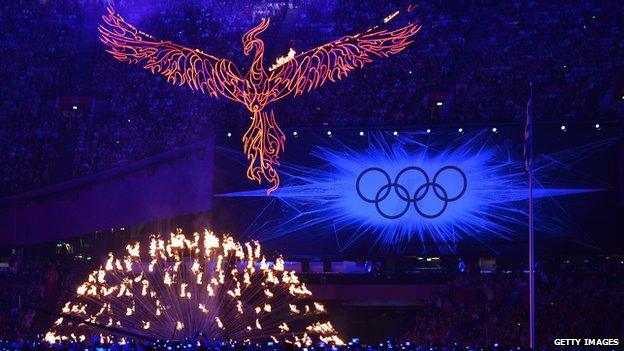
The closing ceremony of the Olympic Games has a difficult task to perform. The less-loved younger sibling to the opening ceremony on which all the attention is lavished, it rarely supplies the memories that anyone takes away from an Olympiad.
It falls between a celebration and a wake, a weird circus and a wonderful street carnival, with some Olympian bombast thrown in. For London 2012's valediction, it was all this and quite a lot more.
Where two weekends ago Danny Boyle created a patchwork narrative of a multifaceted Britain at peace with its post-colonial heritage, there was less attempt here to string together a coherent story. If there was a theme to A Symphony of British Music beyond the chance to show off Team GB's global pop superstars and send out a small army of performers in wacky outfits, it was perhaps that, despite what you may have read about social mobility grinding to a halt, Britain is still on the move.
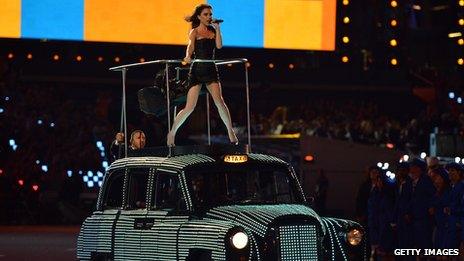
The Spice Girls sang on top of five London taxis
Rather than walk on, most performers were delivered by some sort of symbolic conveyance. Ray Davies entered in a taxi, Madness on a lorry, Pet Shop Boys on rickshaws, One Direction on a truck, Annie Lennox on a giant black ship and Ricky Wilson of the Kaiser Chiefs at the head of a fleet of mopeds. Russell Brand serenaded the stadium from the roof of a magical mystery tour bus. None of them moved across the track as fast as Usain Bolt on his own two legs.
The gigawattage count was, as predicted, off the chart, with every era of the UK's post-war musical history showcased. Almost everybody could be there, and if they couldn't, they sent their holograms. John Lennon was represented by video and a giant piecemeal cast of his face, designed by his widow Yoko Ono, as children sang and signed "Imagine", while Freddie Mercury roused the crowd virtually with a call-and-response routine.
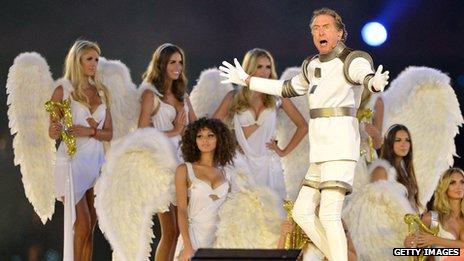
Eric Idle gave a rendition of Always Look on the Bright Side of Life
David Bowie may not have been there, but as Fashion filled the stadium four iconic British supermodels including Kate Moss and Naomi Campbell put on a fleeting floor show. Others had people sing for them. Ed Sheeran deputised for Dave Gilmour on Pink Floyd's "Wish You Were Here" with Floyd's drummer Nick Mason for company. Jessie J and Tinie Tempah channelled the Bee Gees Dancing, while Brand treated us to his eccentric take on I Am the Walrus. In one notable substitution, Beady Eye sang Oasis's Wonderwall.
But the more significant highlights came along whenever the big names showed off their own wares - Davies singing Waterloo Sunset, George Michael bossing the stadium with Freedom, the Spice Girls sashaying on in black cabs to sing Wannabe and Brian May doing some prodigious axe work. Eric Idle sang Always Look on the Bright Side of Life surrounded by multiple folk dancers and a game operatic star Susan Bullock.
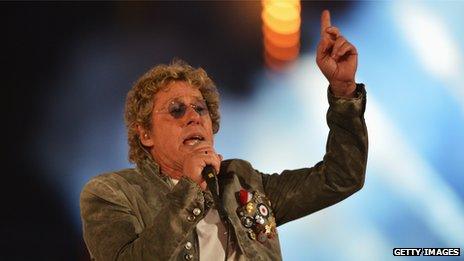
The Who closed a Games aiming to "inspire a generation" with their classic hit
For all their efforts, the best singing of the night was choral - the gospel choir performing the National Anthem, and the combined London Welsh choirs who spiced up the Olympic anthem.
The show featured a dazzling and sometimes befuddling parade of street theatre. There were tightrope walkers, dangling percussionists, bendy, bouncy acrobats, a human cannonball or two and a phalanx of cyclists who seem to have misinterpreted Bradley Wiggins' advice on bike helmets.
It all took a long old while to get into the groove, not entirely because it takes a lot more than two songs by Elbow to get 10,000 athletes out onto the pitch to join the party. It began on the set of a mock-up London cityscape snarling with the hustle and bustle of traffic. Vehicles and citizenry were wrapped in newsprint, a message for the nabobs of China clearly legible - we operate a free press round these parts.
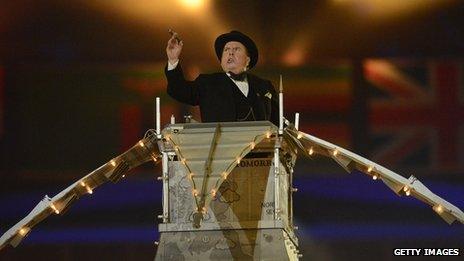
Timothy Spall played a Shakespeare-quoting Winston Churchill
The stage, forming the spokes of the Union Jack, was covered with quotations from the greats of our literature, among them were the torn-off words of Samuel Johnson: "A man who is tired of London is tired of life." Echoing the opening ceremony, we heard once again from Caliban, this time quoted by Timothy Spall playing Churchill, before the ceremony embarked on a long evening of music and dance.
There was one other echo. As before, the loudest and longest cheers were reserved for the volunteers who more than anyone have made the Games happen.
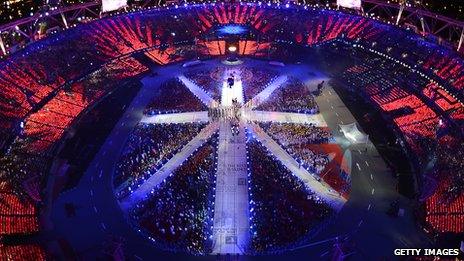
The stage was laid out according to the spokes of the Union Jack
"When our time came, Britain," said Lord Coe, "we did it right." Once the formalities were done - the Brazilian section featuring samba and Pele, a last stab at flag-waving from the Mayor of London and the speechifying - all that was needed was some sort of finale. Take That ruled the world and Darcey Bussell flew in on a phoenix to dance with the Royal Ballet one last time. Thomas Heatherwick's spectacular flames were finally extinguished before the pension-age members of The Who sang us out with My Generation to a generation young enough to be their grandkids.
Did it all work? Sometimes yes but, as often, not really. The lighting display across the raked seating look spectacular from the blimp camera prowling over the stadium, but the filigree details of circus performance and choreographed trickery were lost as the cameras, as is usual on these occasions, had no idea where to look.
The audience was eventually battered into submission by the bloated sound and hectic fury of Britain's greatest hits, but three hours felt somewhat on the long side for a show that didn't quite know how to wave goodbye. But we know why. Bidding farewell to these games is not going to be easy.
Jasper Rees is the author of Bred of Heaven: One Man's Quest to Reclaim His Welsh Roots
- Published13 August 2012
- Published13 August 2012